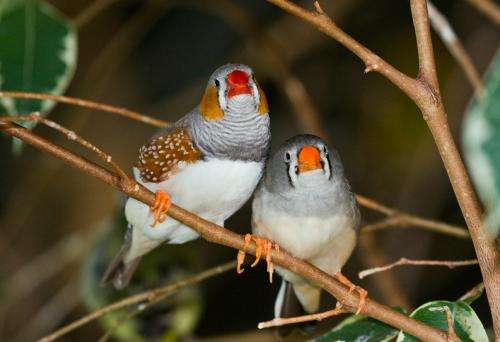Negotiating parental duties as simple as talking about it for birds

Deakin University scientists have completed a world-first study into how birds negotiate parental workloads, finding the answer is as simple as talking to each other.
Lead researcher, Alfred Deakin Postdoctoral Research Fellow Dr Mylene Mariette, said the study of 12 pairs of Australian zebra finch (Taeniopygia guttata) was an important step towards understanding how animal cooperation had evolved.
The research, Vocal negotiation over parental care? Acoustic communication at the nest predicts partners' incubation share, is published in the latest edition of Biological Journal of the Linnean Society.
Dr Mariette, from Deakin's Centre for Integrative Ecology within the School of Life and Environmental Sciences, said it was well-known that birds negotiated how much each parent worked to feed their chicks or incubate the eggs, but until now no one had asked how they reach their agreements.
Dr Mariette said the zebra finch formed life-long monogamous relationships, sharing an even amount of childcare responsibility from incubation to feeding, suggesting a high level of cooperation, making them ideal participants in the study to determine just how they reach such mutual understanding.
During the study, completed in collaboration with a team of acoustic experts in France, the scientists deliberately delayed the return of the male partner to the nest so that he took one hour to come back, instead of the normal 30 minutes. And then they noted the response from the female parent.
"We found that rather than respond by taking as long to return as her partner had, the female's length of absence correlated with how much time the male had spent vocalising when he had come back," Dr Mariette said.
"If the male called only a few times when he was late then the female's subsequent absence was in line with the male's, but if the delayed male had called extensively, the female returned from foraging in less than half an hour.
"There are many different ways cooperation can play out, including through retaliation measures, tit-for-tat behaviour, or even more controlled policing, but our study shows that birds discuss the issue and when lateness is explained the female does not make her partner pay by taking as long as he did."
Dr Mariette said understanding how birds negotiate workload was important to understand how cooperation functions in animals, and how it´s likely to have evolved.
"The type of up-front communication we witnessed is likely to greatly reduce conflict and improve the quality of parental care, as opposed to a strategy where the female would simply stay away from the nest for as long as the male had spent away," she said.
"Thus, cooperation is a more successful strategy, which would then be more favoured by selection."
Dr Mariette said the next phase in the research would be to investigate honesty.
"We think the birds are likely to be honest most of the time, otherwise the system would break down, but it would be interesting to know what stops them from lying," she said.
"What would the female do if we manipulate her into thinking that her partner constantly lied, for example by increasing his calling rate using playback of recordings?"
More information: Ingrid C. A. Boucaud et al. Vocal negotiation over parental care? Acoustic communication at the nest predicts partners' incubation share, Biological Journal of the Linnean Society (2015). DOI: 10.1111/bij.12705
Provided by Deakin University



















